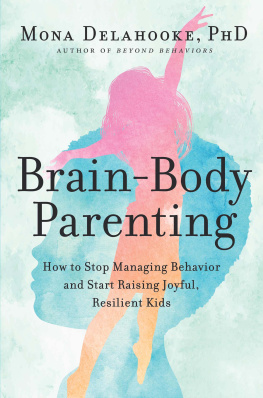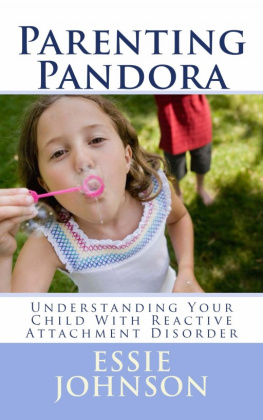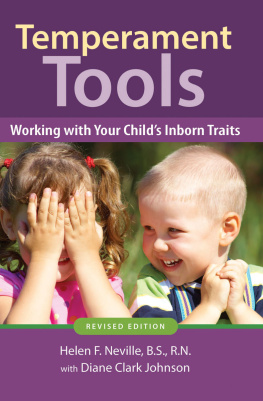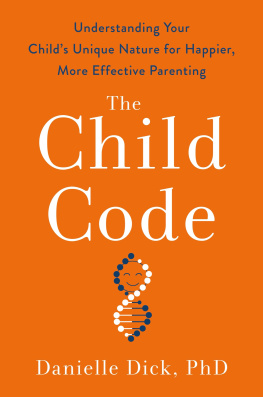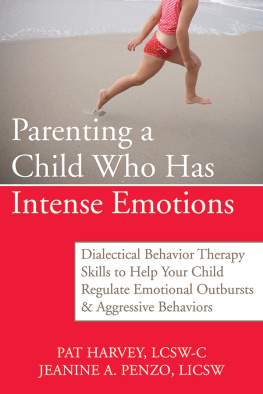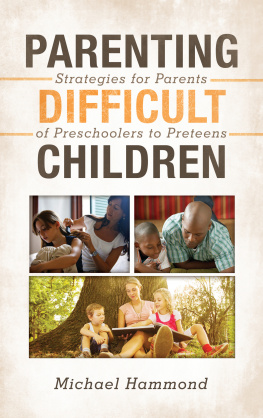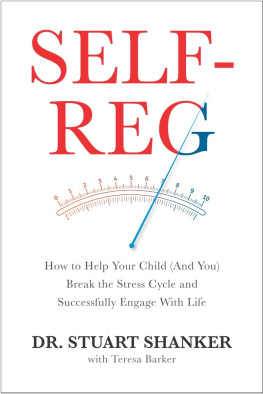Contents
Guide
To my mother, Clara, whose love built the foundation of my very being
Contents
As soon as I heard Janines voice on the phone, I could tell she was distraught.
She had lost her cool with her four-year-old son, Julian. What had begun as a routine shopping trip had spun out of control, morphing into a disaster in the parking lot of the local Target store and leaving Janine feeling both angry and embarrassed.
The next morning, sitting on a couch in my office, she was still raw with emotion as she recounted the incident. Janine was hardly a novice at managing children. She had taught second grade for a decade before becoming a mom, displaying such classroom prowess that she had won multiple teaching awards. As for Julian, he had been a precocious child who walked at eleven months and was speaking a few words by his first birthday. But he sometimes had difficulty controlling his emotions and following instructions. Even when his mother offered incentives for good behavior, Julian often struggled to comply.
That day, as mother and son were waiting in the checkout line, Julian had suddenly grabbed a candy bar from the rack.
Put that back, please! Janine pleaded.
When Julian refused, Janine shifted instinctively into the mode that had served her well handling classroom outbursts: First she tried to distract her son, and then, when that failed, she told him that if he didnt relinquish the candy, she wouldnt give him the reward sticker she routinely placed on his behavior chart each day. Janine did her best to be consistent and calm. But on this day, the more she spoke to her son, the more defiant he became.
Finally, Julian snapped, hurling the candy bar smack in the cashiers face.
Julian! Janine screamed. You are being so bad! She quickly apologized to the clerk and then abandoned her shopping cart to carry her son, now bawling, to the parking lot. There, she shoved him into his car seat and then she, too, broke into tears.
I didnt recognize myself, Janine told me the next day. I just feel so guilty. She had called her son bad when everything she knew about him told her otherwise. When he was calm, he was loving, gentle, and polite.
Why hadnt Janines efforts succeeded in calming her son? Why had things gone so quickly and horribly wrong? And what could she have done differently? Nearly everyone who raises or cares for children has experienced plenty of moments like Janines. In more than three decades as a child psychologist, I have met countless parents like her: caring, compassionate, insightful people, eager to see their children flourish and thrive, but now wondering what they are missing. Again and again, I hear the same refrain: Were doing what the parenting books say to do! Why is it falling short?
These parents are asking the same questions mothers and fathers have posed for generationsquestions you may have, too: Why does my daughter refuse to cooperate or listen to me? Why is my sons behavior so unpredictable? Why is he such a picky eater? Why cant she sleep through the night? How can we set appropriate limits? How can I tell whether Im expecting too much from my childor too little? And then theres perhaps the most important question Janine asked me that morning, one that Ive heard from countless parents before and since: Why do I keep losing it with my child when I know better?
Just as they share these questions and concerns, most parents also share the same deeply felt desire: to raise children who will grow up to be resilient, confident, happy, and independent people. But how to do that? Whose parenting advice is worth following? Parents today are bombarded with more guidance from more perspectives than ever before, from social media influencers to friendly (or judgmental) neighbors to school specialists to TED Talks to whatever a Google search turns up. You can choose among conscious parenting and attachment parenting and free-range parenting and dozens of other philosophies. Which is best? And whats the optimal solution to challenging behaviors? Time-outs? Reasoning? Ignoring? Pausing and counting to three? Something else?
Of course, parents want whats best for their children, but many of those I see in my practice are understandably confused and perplexed about what that is. With so many perspectives to choose from, whose wisdom can you trust? In more than three decades working with children and their families, I have come to realize that there is no one-size-fits-all approach to successful child-rearing. Whats most important isnt the rules but the child. Whats crucial isnt understanding someone elses guidelines but understanding how our parenting is landing in our child. Once we have some insight into how a child is absorbing the interactions and circumstances they experience, we can begin to discover more personalized and more effective answers to common parenting questions.
The problem is that too often we focus on a childs behaviors instead of the child. Were concerned about solving problems instead of cultivating relationships and building bonds.
In this book, Ill share how you can shift the focus from the behavior to whats underlying the behavior; to redirect your efforts from understanding a parenting approach to understanding your child. My aim is to help you adapt your parenting to the individual needs of your child and, in turn, build a connection that helps them become more resilient.
In short, parenting isnt about a theory or a hypothetical approach. Its about you and your child. This book will help you shift from managing behaviors to using those behaviors as clues to help understand your childs inner realitythe childs sensory experiences, feelings, and emotions.
Most parenting books suggest top-down responses to behavior that are oriented to the childs brain: talking, reasoning, incentivizing, or offering rewards or consequences. These approaches generally offer parents two options: Reason with the child or discipline the child. While these approaches acknowledge a childs cognitive (thinking) capacity, they neglect to account for the childs entire nervous system; in other words, the brain-body connection. After all, the nervous system runs throughout the body, and it sends feedback to the brain. This book acknowledges the equal importance of the body and brain to understanding the child. It will show you how to parent using not just psychology but also biology.
Its important to note up front that the approach youll learn in these pages isnt just based on my own thoughts or observations. Its grounded in cutting-edge neuroscience. It is also a product of my experience as both a clinical psychologist and a mother.
As a graduate student in psychology, I learned to focus on recognizing and diagnosing what was wrongassigning labels to psychological symptoms. When I had my own child, I discovered that the top-down approaches I had learned in grad school, the methods that called for appealing to the childs mind, didnt always work. At least, they didnt help me figure out how to help my baby, who cried for hours on end, or how to convince my anxious ten-year-old that yes, she could handle a sleepover at a friends house. So a decade into my career, I stepped away from my practice to seek out better answers to the challenges that parents brought to me and that I faced myself as a mother. What I discovered profoundly changed my practice and my view of parenting.
I decided to start from the beginning. My traditional training hadnt included much insight into infant development and how to help babies, so I enrolled in two training programs focused on infant mental health. I spent three years in hospital, clinic, and preschool settings, studying babies and toddlers. The experience opened my eyes to the crucial impact of early development.

